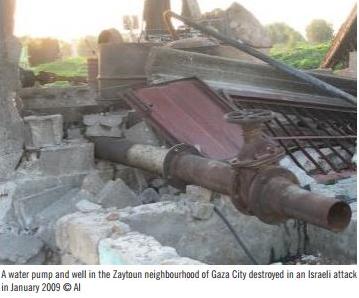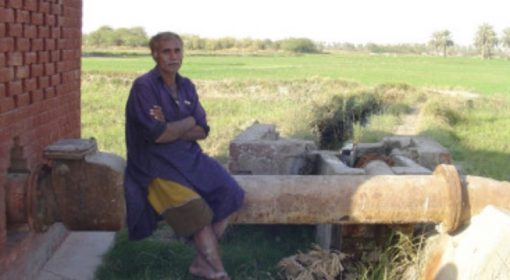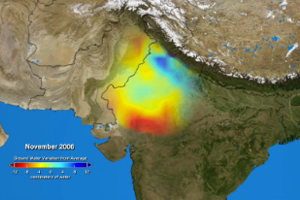It is one thing to live in an area where groundwater is available, having access to it is another. If it were as easy as just drawing a cross in the sand and drilling a hole there, it might have been chosen over accessing surface water many more times.
Groundwater is ubiquitous, you can get it almost anywhere. Thereby it is more reliable and thus in essence ensures that other water-dependent investments will not be lost. You can drill a hole at a fraction of the costs of a surface water system, which requires diversion structures, and have access to a water supply. Also, the drilling is hard to control by regulators, as it is on people’s own land. However, the volumes of groundwater that can be extracted from a single borehole should also be taken into account. These are often quite limited and therefore a wide well field would be needed to provide a large city access to a water supply. So depending on scale, both groundwater and surface water have their advantages. Unfortunately, not even access to one of the two is a matter of course for everyone on this planet, let alone the choice of which to access.

Image courtesy: Amnesty International
Many causes can be appointed for people lacking decent access to groundwater reserves. An important factor is also emphasized in the ‘politics section’ of this dossier, namely political tussle and powerplay. Amnesty International’s report ‘Troubled Waters – Palestinians denied fair access to water’ describes how the conflict between Israel and Palestine has forestalled, and still forestalls, a large amount of Palestinian inhabitants access to water resources of different aquifers. For instance: on top of being deprived from an equitable share of the Mountain Aquifer, Palestinians have to buy water from Israel, who often reduce the supplies, in order to complement their own insufficient reserves. Also, the Palestinian inhabitants of the Gaza Strip see their water supply affected by Israelian extraction from the aquifer which underlies Gaza. The video below shows these and other consequences of the Israelian-Palestinian conflict for access to (ground)water.
Extraction by one user effecting the availability of groundwater for another is also taking place on a smaller scale, between farmers in the same area for example. This can lead to informal arrangements between small-scale farmers to obtain access to groundwater, for instance through another’s tubewell, based on principles ranging from ‘mutualism’, ‘solidarity’ to more commercial aims. However, often certain categories of farmers are excluded from these arrangements, making them even more vulnerable, especially when overuse is caused by the privileged groundwater extractors. This exclusion brings us to another important factor determining access to groundwater: the lack of means to extract. As for the tubewells, some farmers are able to drill them and others are not. It is very likely that the latter simply lack the capacity to mobilize enough social and financial capital. This is the case for small scale farmers in Ouarizane, Algeria. In a paper on how unequal access to groundwater contributes to marginalization of small farmers, Amichi et al. (2012) appoint farm differentiation as a result of the ability of farmers to obtain access to water. They link successive differentiation to different factors, for example to the fact that they encountered farmers who were not able to drill tubewells because of the high costs. Amichi et al. estimated the average cost of boring to a depth of 100m at about €10 000 in 2010, and this did not even include the costs of irrigation equipment. For starters, this amount of financial capital needed is impossible to mobilize for the 23 per cent of the Algerian population living below the national poverty line.
Poverty not only causes lack of access, it also follows from it. In combination with (social) inequity and favouritism, it can become a vicious circle in which people are trapped. Benefits of groundwater, like the increase of agricultural activity, risk reduction of loss due to drought and reduction of time spent obtaining water, are not for those who lack the access. This way existing socio-economic disparities between farmers are aggravated. Also, more wealthy farmers often own more land, as this represents assets as well. Large-scale farmers are favoured by unrestricted access to groundwater, because they are able to drill deeper and in more places when groundwater tables go down.
The poverty trap is not just a farmer’s issue however, it can also withhold an entire village from their water supply. Inhabitants who lack other means but a borewell that has been running empty for a year, are forced to walk a kilometer to fetch contaminated water from a hole in the ground. This way, a vast amount of their precious time is taken away from income-generating activities both by sickness and by walking to the source and back. The video below shows Aydega village in India, where the 35 families have not received water from their well for a year. They are not able to mobilize capital to fix this themselves, and are still waiting for the regional government to take up action.
In conclusion, access can be hindered by many factors. Political tussle, one extracting on the expense of another, exclusion, lack of means, overuse, pollution and relocation all can create a big distance between inhabitants and groundwater in the same area. When examining access to groundwater; poverty, social marginalisation and being the victim of a conflict should all be taken in consideration as they have proven to closely correlate with a lack of (decent) access. All three can be a cause as well as a consequence of a person not being able to make use of the water that is right beneath his or her feet.
More info:
Amnesty International. (2009). Troubled Waters – Palestinians denied fair access to water London: Amnesty International Publications
Amichi, H., Bouarfa, S., Kuper, M., Ducourtieux, O., Imache, A., Fusillier, J-L., Bazin, G., Hartani, T., Chehat, F. (2012). How Does Unequal Access to Groundwater Contribute to Marginalization of Small Farmers? The Case of Public Lands in Algeria Irrigation and Drainage 61 (S1) P. 34-44 (http://dx.doi.org/10.1002/ird.1660)
Moench, M. (2003). ‘Chapter 21: Groundwater and poverty: exploring the options’ in Llamas, R., Custodio, E. (2003). Intensive Use of Groundwater – Challenges and Opportunities Lisse: Swets & Zeitlinger B.V.

